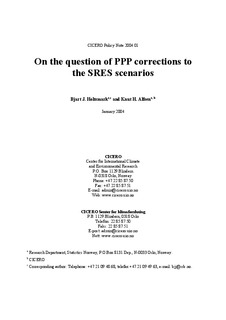| dc.contributor.author | Holtsmark, Bjart | nb_NO |
| dc.contributor.author | Alfsen, Knut H. | nb_NO |
| dc.date.accessioned | 2014-03-17T14:28:44Z | |
| dc.date.available | 2014-03-17T14:28:44Z | |
| dc.date.issued | 2004 | nb_NO |
| dc.identifier.issn | 0804-4511 | nb_NO |
| dc.identifier.uri | http://hdl.handle.net/11250/191796 | |
| dc.description.abstract | Ian Castles and David Henderson have criticized IPCC’s Special Report on Emissions Scenarios (SRES) (IPCC, 2000) for using market exchange rates (MER) instead of purchasing power parities (PPP) when converting regional GDP into a common denominator. The consequence is that poor countries generally appear to be poorer than they actually are. An overstated income gap between rich and poor countries in the base year gives rise to projections of too high economic growth in the poor countries because the scenarios are constructed with the aim of reducing the income gap. Castles and Henderson claim that overstated economic growth means that greenhouse gas emissions are overstated as well. However, because closure of the emission intensity gap between the rich and the poor parts of the world is another important driving force in the scenarios, we argue that the use of MER in the SRES scenarios has not caused an overestimation of the global emission growth because the two types of errors effectively neutralize one another. | nb_NO |
| dc.language.iso | eng | nb_NO |
| dc.publisher | CICERO Center for International Climate and Environmental Research - Oslo | nb_NO |
| dc.relation.ispartof | CICERO Policy Note | nb_NO |
| dc.relation.ispartofseries | CICERO Policy Note;2004:01 | nb_NO |
| dc.title | On the question of PPP corrections to the SRES scenarios | nb_NO |
| dc.type | Working paper | nb_NO |
| dc.source.pagenumber | 8 | nb_NO |
| dc.identifier.cristin | 1728022 | |
